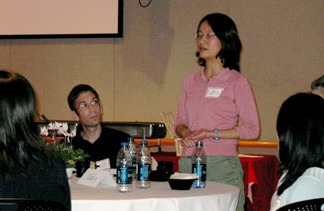Women in science credit flexibility as key to career success
By Sandra Holley

Balancing family with a career in science requires a large degree of flexibility, claimed women scientists at the Women in Science at Cornell (WISC) annual couples' dinner, held Nov. 27 in G10 Biotechnology Building.
Susan Suarez, professor of biomedical sciences, and Bik Tye, professor of molecular biology and genetics, agreed that part of that flexibility means having a flexible spouse. They were addressing about 70 female undergraduates, graduate students, faculty and research fellows, some with spouses.
In the 1970s, when Tye first started as an assistant professor at Cornell, she spent the first year apart from her husband, S.H. Henry Tye, who was working as a physicist at Fermi National Accelerator Laboratory in Batavia, Ill. To be closer to his wife, who was then pregnant, her husband took a senior research associate position in Cornell's physics department. His flexibility was instrumental, Tye said, in helping her climb the academic ladder. Both Tyes were eventually promoted to full professor positions.
Suarez said that her husband, Wayne Gottlieb, also served as the "trailing spouse," working only part time in molecular biology laboratories to allow time to help raise their two children. "I've been flexible; we've both been flexible. I did what I could to take care of the kids," said Gottlieb. "And, when the kids were old enough, I decided to go into teaching. I got a teaching certificate, and I now teach middle school."
Sharing household duties also was a common theme discussed at the dinner and was reiterated by Cornell President David Skorton, who attended as the invited spouse of Robin Davisson, a new Cornell faculty member with a joint appointment in the Department of Biomedical Sciences and in the Department of Cell and Developmental Biology at Weill Cornell Medical College in New York City.
"We're pretty efficient people at work, but somehow it takes both of us everything we can do to get through the day at home," said Skorton. As a dual-career couple, Skorton credited Davisson for taking leadership in creating a balance between work and life.
Davisson also expressed the importance of having a partner who will share in life's activities, its joys and challenges. "A partner, friends, family, whatever it is … that's critical," she said. "Here at Cornell, it's so wonderful to have great women scientists leading us. As great as it is, we could still work on life/balance issues. There are realities of micro-inequity in our academic environments."
This year, for example, Cornell was awarded $3.3 million from the National Science Foundation (NSF) to work on recruiting, retaining and promoting more women in leadership positions as a part of the NSF's ADVANCE program.
Although the annual couples' dinner is one of WISC's most popular events, the undergraduate student organization offers other dinners, lectures and events throughout the year to connect female students with female academics.
"WISC has been an opportunity to address issues that I wouldn't have addressed anywhere else and to listen to other women address my questions," said WISC President Christina Nowik '07, a biology major. "And, where everyone is going to appreciate, 'when am I going to want to have my kids' as something that's important, it's really great meeting women who have [been through it.] People are right there, just ready to open up to each other, and it's great."
Graduate student Sandra Holley is a writer intern at the Cornell Chronicle.
Media Contact
Get Cornell news delivered right to your inbox.
Subscribe